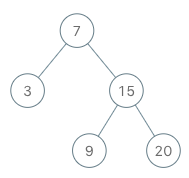Algorithm
Problem Name: 173. Binary Search Tree Iterator
BSTIterator class that represents an iterator over the in-order traversal of a binary search tree (BST):BSTIterator(TreeNode root)Initializes an object of theBSTIteratorclass. Therootof the BST is given as part of the constructor. The pointer should be initialized to a non-existent number smaller than any element in the BST.boolean hasNext()Returnstrueif there exists a number in the traversal to the right of the pointer, otherwise returnsfalse.int next()Moves the pointer to the right, then returns the number at the pointer.
Notice that by initializing the pointer to a non-existent smallest number, the first call to next() will return the smallest element in the BST.
You may assume that next() calls will always be valid. That is, there will be at least a next number in the in-order traversal when next() is called.
Example 1:

Input ["BSTIterator", "next", "next", "hasNext", "next", "hasNext", "next", "hasNext", "next", "hasNext"] [[[7, 3, 15, null, null, 9, 20]], [], [], [], [], [], [], [], [], []] Output [null, 3, 7, true, 9, true, 15, true, 20, false] Explanation BSTIterator bSTIterator = new BSTIterator([7, 3, 15, null, null, 9, 20]); bSTIterator.next(); // return 3 bSTIterator.next(); // return 7 bSTIterator.hasNext(); // return True bSTIterator.next(); // return 9 bSTIterator.hasNext(); // return True bSTIterator.next(); // return 15 bSTIterator.hasNext(); // return True bSTIterator.next(); // return 20 bSTIterator.hasNext(); // return False
Constraints:
- The number of nodes in the tree is in the range
[1, 105]. 0 <= Node.val <= 106- At most
105calls will be made tohasNext, andnext.
Code Examples
#1 Code Example with C Programming
Code -
C Programming
struct BSTIterator {
struct TreeNode **stack;
int sp;
};
int depth(struct TreeNode *node) {
int l, r;
if (!node) return 0;
l = depth(node->left) + 1;
r = depth(node->right) + 1;
if (l > r) return l;
return r;
}
void push_left(struct BSTIterator *obj, struct TreeNode *node) {
do {
obj->stack[obj->sp ++] = node;
node = node->left;
} while (node);
}
struct BSTIterator *bstIteratorCreate(struct TreeNode *root) {
struct BSTIterator *obj;
int d = depth(root);
obj = calloc(1, sizeof(*obj));
//assert(obj);
if (d) {
obj->stack = malloc(d * sizeof(struct TreeNode *));
//assert(obj->stack);
push_left(obj, root);
}
return obj;
}
/** @return whether we have a next smallest number */
bool bstIteratorHasNext(struct BSTIterator *iter) {
return (iter->sp) ? true : false;
}
/** @return the next smallest number */
int bstIteratorNext(struct BSTIterator *iter) {
struct TreeNode *node;
node = iter->stack[-- iter->sp];
if (node->right) push_left(iter, node->right);
return node->val;
}
/** Deallocates memory previously allocated for the iterator */
void bstIteratorFree(struct BSTIterator *iter) {
if (iter->stack) free(iter->stack);
free(iter);
}
Input
Output
#2 Code Example with C++ Programming
Code -
C++ Programming
class BSTIterator {
public:
BSTIterator(TreeNode *root) {
load(s, root);
}
/** @return whether we have a next smallest number */
bool hasNext() {
return !s.empty();
}
/** @return the next smallest number */
int next() {
int n = s.top();
s.pop();
return n;
}
private:
stack < int>s;
void load(stack<int>& s, TreeNode* root){
if(!root) return;
load(s, root->right);
s.push(root->val);
load(s, root->left);
}
};
Input
Output
#4 Code Example with Javascript Programming
Code -
Javascript Programming
const BSTIterator = function(root) {
this.root = root;
this.stack = [];
};
/**
* @return the next smallest number
* @return {number}
*/
BSTIterator.prototype.next = function() {
while (this.root) {
this.stack.push(this.root);
this.root = this.root.left;
}
this.root = this.stack.pop();
const result = this.root.val;
this.root = this.root.right;
return result;
};
/**
* @return whether we have a next smallest number
* @return {boolean}
*/
BSTIterator.prototype.hasNext = function() {
return this.root || this.stack.length;
};
Input
Output
#5 Code Example with Python Programming
Code -
Python Programming
class BSTIterator:
def __init__(self, root: TreeNode):
self.stack = []
self.pushAll(root)
def next(self) -> int:
cur = self.stack.pop()
self.pushAll(cur.right)
return cur.val
def hasNext(self) -> bool:
return self.stack
def pushAll(self, node):
while node != None:
self.stack += (node,)
node = node.left
Input
Output
#6 Code Example with C# Programming
Code -
C# Programming
using System.Collections.Generic;
namespace LeetCode
{
public class _0173_BinarySearchTreeIterator
{
private readonly Stack < TreeNode> stack;
public _0173_BinarySearchTreeIterator(TreeNode root)
{
stack = new Stack();
LeftMostInorder(root);
}
private void LeftMostInorder(TreeNode root)
{
while (root != null)
{
stack.Push(root);
root = root.left;
}
}
/** @return the next smallest number */
public int Next()
{
var node = stack.Pop();
if (node.right != null)
LeftMostInorder(node.right);
return node.val;
}
/** @return whether we have a next smallest number */
public bool HasNext()
{
return stack.Count > 0;
}
}
}
Input
Output
